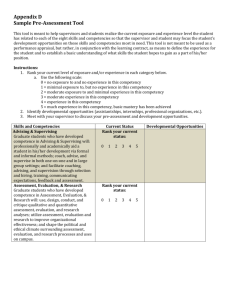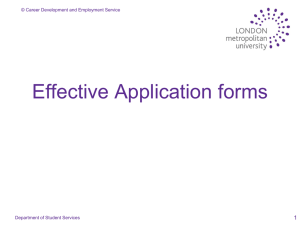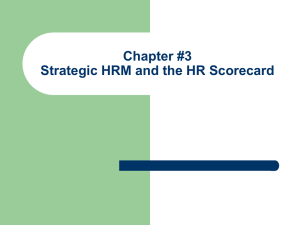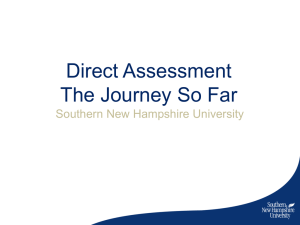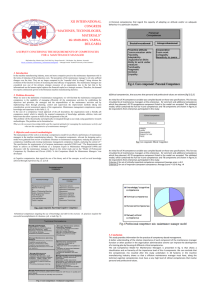Graduate Assistant Competencies Committee Presentation
advertisement
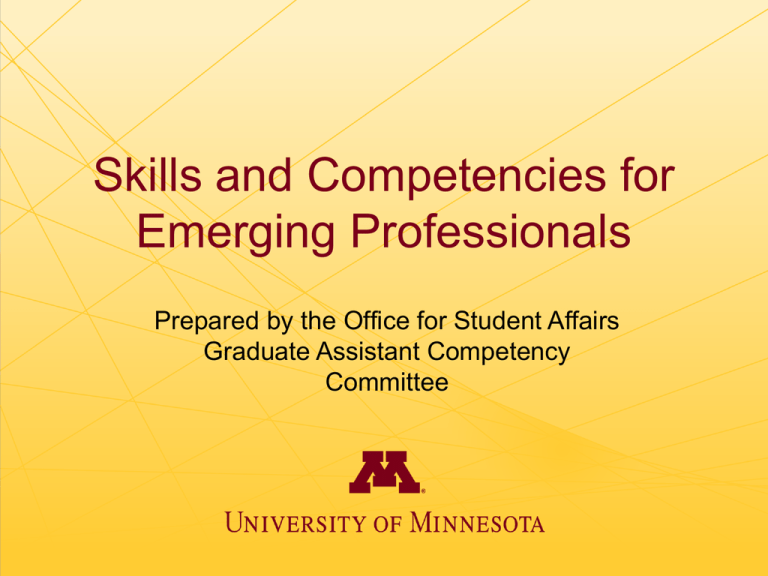
Skills and Competencies for Emerging Professionals Prepared by the Office for Student Affairs Graduate Assistant Competency Committee Agenda • Issues and Committee Charge • Partnerships • Position Examination (Practicum/Field Study, Internship, Graduate Assistantship) • Skills and Competencies • Testimonials • Benefits • Tools • Next Steps Issues to Resolve • Lack of practical opportunities for students in Master’s programs • Financially challenging to hire GAs • How can we match departments with qualified candidates, while also increasing opportunities for Master’s students? • How can we maximize the experiences for Graduate students and prepare them for work post-graduation? • How can we create a more consistent framework for opportunities? • How can we better inform Graduate students about learning and placement opportunities across departments? • How do we strengthen recruitment practices? Committee Charge (Nov. 2009) • Review existing competency programs for Graduate Assistants at other institutions • Develop a competency program for the University of Minnesota that can be used across all areas of Student Affairs • Explore the different employment options available to departments and develop a consistent program plan for the departments within Student Affairs • Recommend an implementation plan for the new competency program and employment options program plan. Committee Members • • • • • • • • Mandi Watkins Soderlund, chair Rebecca Ropers Huilman & Darwin Hendel, OLPD Karen Miksch, PSTL Debra Anderson, Sally Bauer, & Hans Peterson, SUA Susan Warfield, SPHC Patricia Jones Whyte, OED Susan Cable-Morrison, OHR Via email: – Chad Ellsworth, FSL & Carrie Burke, CSPP Partnership • Academics and OSA – It is vital in the development of student affairs/service professionals that they gain practical experiences with students before graduation – With that practical experience, students are more prepared in the classroom – Other examples of an Academic/Student Affairs partnership: • Leadership Minor • Engagement Initiative Partnership • OLPD, PSTL, CSPP – It is in the best interest of CEHD that academic units are partnering to provide the best possible experience for students Postions • Practicum/Field Study – Always academic credit • Advising student groups in both group and individual settings • Internships – Sometimes academic credit • Planning and implementing a program/event • Assistantships – Seldom/Never academic credit • Student Activities GA: – – – – Advise program board committees Register/advise student groups Plan/implement events Participate in/on committees Funding Positions • Practicum/Field Study – No employer/employee relationship – No pay or stipend • Internships – Sometimes employer/employee relationship – No pay, stipend, or hourly • Assistantships – Always employer/employee relationship – $17.01/hour plus tuition and benefits Skills & Competencies • SDO and SLO program developed for undergrads in 2007 • No such program for Graduate and Professional students • Students need to be able to articulate what they have gained from Graduate experiences National Movement • 2010 ACPA, NASPA, & CAS Competencies Document rolled out at national conferences – http://www.naspa.org/regions/regioniii/Professional%20Competency.pdf • Recommended 10 competencies for all Student Affairs Practitioners: – – – – – – – – – – Advising & Helping Assessment, Evaluation, & Research Equity, Diversity, & Inclusion Ethical Professional Practice History, Philosophy, & Values Human & Organizational Resources Law, Policy, & Governance Leadership Personal Foundations Student Learning & Development U of M Skills & Competencies • • • • • • • • Advising & Supervising Assessment, Evaluation, & Research Human & Organizational Resources Multiculturalism, Inclusion, & Equity Policy, Governance, & Law Professional & Ethical Practice Professional Knowledge & Orientation Student Learning & Development U of M Skills & Competencies • Advising & Supervising Definition Graduate students who have developed competence in Advising & Supervising will: professionally and academically aid a student in his/her development via formal and informal methods; coach, advise, and supervise in both one-on-one and in large group settings; and facilitate coaching, advising, and supervision through selection and hiring, training, communicating expectations, feedback and assessment. U of M Skills & Competencies • Assessment, Evaluation, & Research Definition Graduate students who have developed competence in Assessment, Evaluation, & Research will: use, design, conduct, and critique qualitative and quantitative assessment, evaluation, and research analyses; utilize assessment, evaluation and research to improve organizational effectiveness; and shape the political and ethical climate surrounding assessment, evaluation, and research processes and uses on campus. U of M Skills & Competencies • Human & Organizational Resources Definition Graduate students who have developed competence in Human & Organizational Resources will: demonstrate skills and knowledge in the selection, supervision, motivation, and formal evaluation of staff; appropriately resolve conflict; manage the politics of organizational discourse; effectively apply strategies and techniques associated with financial resources, facilities management, fundraising, technology use, crisis management, risk management, and sustainable resources; and understand and conduct budgeting and financial resource management. U of M Skills & Competencies • Multiculturalism, Inclusion, & Equity Definition Graduate students who have developed competence in Multiculturalism, Inclusion, & Equity will: create higher education learning environments that are enriched with diverse views and people of varied backgrounds, races, cultures, and beliefs; create an institutional ethos that engages in multiculturalism and helps to increase self awareness and knowledge of multiple groups different from self; and pursue equity for all members of the campus community. A broad understanding of multiculturalism is employed that includes race, ethnicity, class, gender, sexual orientation, disability, age, and religion, so as to acknowledge that personal identity is complex and intersectional. U of M Skills & Competencies • Policy, Governance, & Law Definition Graduate students who have developed competence in Policy, Governance, & Law will: apply current legal constructs and policy development processes used in various contexts, and understand governance structures and their impact on one’s professional practice; and recognize laws, policies, and procedures at the campus, local, state, and federal level that impact one’s professional practice. U of M Skills & Competencies • Professional & Ethical Practice Definition Graduate students who have developed competence in Professional & Ethical Practice will: professionally and appropriately represent one’s self, the unit/organization and University in accordance with set standards and expectations; understand and recognize the importance and application of ethical standards and practices in one’s work, pertaining to professional relationships with colleagues, students and external groups and in financial matters; the interpretation and application of policies and standards; and understand how and when viewpoint neutrality applies to the position. U of M Skills & Competencies • Professional Knowledge & Orientation Definition Graduate students who have developed competence in Professional Knowledge & Orientation will: connect the history, philosophy, and values of the profession to one’s current professional practice; work both independently and collaboratively to effect change and create a vision; have a passion for work and remain curious; and establish life-long learning through professional development such as conferences, publications, and best practices. U of M Skills & Competencies • Student Learning & Development Definition Graduate students who have developed competence in Student Learning & Development will: demonstrate knowledge and understanding of concepts and principles of student development and learning theory; apply theory to improve and inform student affairs practice, as well as understand teaching and training theory and practice; and apply the University of Minnesota Student Development and Learning Outcomes to all programs, activities, and Advising & Supervising practice. Testimonials • Maggie Towle, Director of Student Unions & Activities – Restructured to offer 4 GA positions in 2007 – Has offered Practicum experiences for CSPP – Looking into offering more internship/practicum experiences for students moving forward • Susan Warfield, Director of Student Parent HELP Center – Works with Social Work field study students each year; the positions are unpaid for certification credit – Staffing of office would not be possible without these students Benefits to you • Pipeline of employees • Value added components • Better investment with pre-determined competencies • Partnerships across the U leverages the positive use of resources Helpful Tools • Appendices from report A. Position comparison chart (pgs 11-12) B. Skills and Competencies for Emerging Professionals chart (pgs 13-16) C. Sample Learning Contract (pgs 17-21) D. Sample Pre-Assessment Tool (pgs 22-24) E. Sample Performance Review Form (pgs 25-32) Committee Next Steps/Goals • Create a website with all the forms available for supervisors – The website will be operational by March 2011 and accessible through www.osa.umn.edu • Future committee considerations: – Recruitment/Job fair – Database – Increased number of opportunities Your Next Steps/Goals • Visit the website and contact us if you are interested in exploring these options • We will assist you in launching the skills and competencies program within your area, including working with HR to determine appropriate employer/employee relationships and pay scales Questions?

